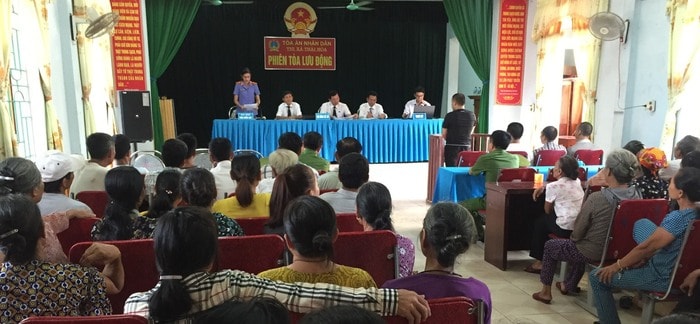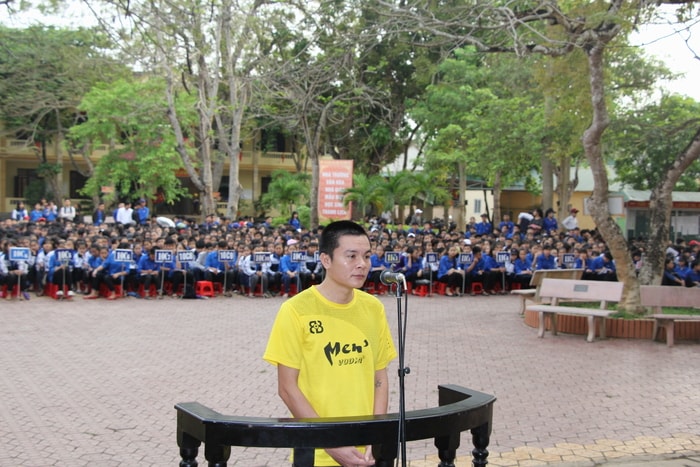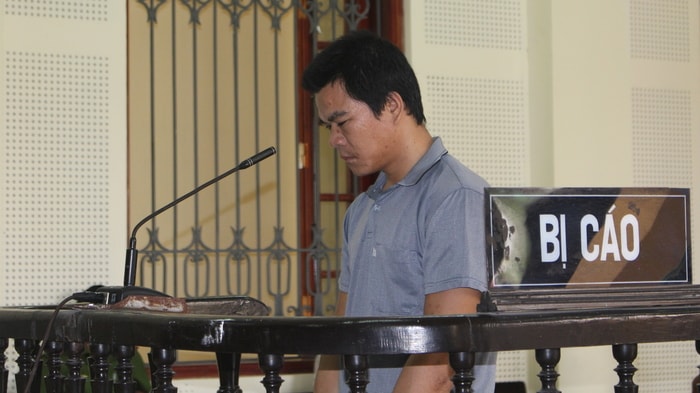Avoiding adverse effects in mobile trials
(Baonghean) - Mobile trials are considered one of the visual forms of legal propaganda that bring practical results, contributing to deterring subjects at risk of violating the law. However, many factors need to be considered to avoid "reverse effects".
Mobile trial for... deterrence
Mobile trials are a form of public trials held at the headquarters of hamlets and communes where the case occurred or where it is considered a “hot spot” of the crime being tried. Through the process of questioning, arguing and sentencing, the panel of judges analyzes, propagates and disseminates relevant legal provisions so that those present at the trial can clearly understand and thereby draw lessons for themselves on how to behave in life.
Especially in remote areas, areas with a large number of ethnic minorities, where people's legal knowledge is limited, this is a very effective channel for disseminating legal education.
 |
| A mobile trial was held in Thai Hoa town. Photo: Contributor |
Having directly tried many times at mobile courts, Mr. Vi Van Chat - Chief Judge of the Criminal Court of the Provincial People's Court said: "In reality, many people have a very vague understanding of the law. When watching a trial at their own place of residence, following the trial process from real people and real events, they have access to the law right from the verdict, so the results are very positive."
To prove the above point, the chief criminal judge told about a mobile court at the end of last year in Tri Le commune (Que Phong). That morning, Tri Le people packed the entire hall of the commune People's Committee. The subjects brought to trial were Tran Thi Ty and Luong Thi Van, both residing in Tuong Duong district. Before that, when they learned that Ha Thi Thuy and Luong Thi Tuyet (residing in Muong Noc commune, Que Phong district) wanted to go to China to do business, Ty and Van immediately seized the opportunity, promising to help them achieve their wishes. After that, Ty took these two girls to Vinh city to meet Van, they agreed to take Tuyet and Thuy to China to get married for 70-80 million VND.
When Van took Thuy and Tuyet to Quang Ninh, they were caught red-handed by the police. Immediately after her accomplice was arrested, Tran Thi Ty surrendered. At the trial, after reviewing the evidence and details of the crime, the jury sentenced Tran Thi Ty to 4 years in prison and Luong Thi Van to 2 years and 6 months in prison for “human trafficking”.
 |
| A mobile trial was held at Tan Ky High School in April 2017. Photo: Contributor |
According to statistics of the Provincial People's Court, in the first 6 months of 2017, the People's Courts at 2 levels have tried 116 criminal cases at first instance. The recorded effectiveness is not only in the aspect of raising people's awareness of the law, ensuring strict punishment and deterrence, but also helping people have more information about new criminal methods, raising awareness, fighting and preventing crimes.
Avoid “backfire”
According to many judicial experts, the purpose of mobile trials is correct, but when put into practice, many problems arise, including "reverse effects". For example, the indictment detailing the method of committing the crime in the case is an opportunity for other subjects to "learn", or cases with violent, horrifying details, related to sexual abuse... will have a negative effect on the subjects being monitored, which are children.
In addition, bringing the defendant to public trial in front of a large crowd, even in cases being tried in the defendant's hometown, will definitely affect the path to rehabilitation later. After all, for criminals, the purpose of punishment is to punish, reform, and educate. When they are put in a situation of being tried in their hometown, they will also receive an additional sentence from public opinion, sometimes even heavier than a prison sentence. At that time, the purpose of reform and education will no longer exist, and will invisibly create more barriers to reintegration into the community.
Expressing his opinion on this issue, Mr. Vi Van Chat said that currently there is no legal document stipulating criteria for bringing a case to mobile trial. This causes difficulties for the judicial agency in the process of selecting cases, leading to the inability to foresee the consequences if any.
Normally, the People's Court of Nghe An province will not hold mobile trials for defendants and victims who are vulnerable in society such as people under 18 years old, people with physical or mental disabilities, or cases related to sexual abuse, because the characteristics of the above cases make the trial counterproductive.
 |
| Defendant Hoang Van Ka in court. Photo: Phuong Thao |
Dr. Lawyer Nguyen Trong Hai - Head of Trong Hai Law Office and Associates said that there are many mobile trials where evidence and charges still have many issues that need to be examined, debated and clarified, and even the case files must be returned for further investigation. This not only wastes time but also does not show its effectiveness. Therefore, when choosing a case to be tried, there must be careful consideration and full preparation of the case files and evidence.
On the other hand, there are many cases where new details and developments arise, but for the purpose of deterrence in the mobile court, the panel of judges tries to end with a harsh sentence; this situation sometimes creates the risk of causing wrongful convictions, affecting the legitimate rights of the defendant. Therefore, the selected panel of judges must be experienced people with solid professional qualifications, ensuring fairness and reasonableness when trying the case.
Phuong Thao
| RELATED NEWS |
|---|


